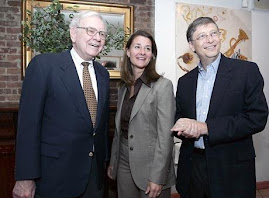I missed an interesting article in Business Times (1 Nov 2007). I noticed that article and after reading it, I find it a very good article to bring reality to the naïve. All my friends who had sought my advice or had learnt investment from me know my very first rule – I never gamble. It’s not that I never but after I understand the truth from warren Buffett, I strongly protest against stock speculation. No doubt occasionally, I still buy lottery but it is a mere $15 per bet for $1 million and that’s it. There is no repercussion and my maximum lost is a fixed $15 (about 2 x MacDonald meals).
Recently one of my friends called me up and asked me questions on trading. What happened was I recommended him to buy China Sunshine Chemical and then when there was alight movement in the price, his colleague advised him to contra off and locked in profit. Then he can buy back at cheap price again and do the same thing again. I replied that I know what game his colleague is playing, but I am not interested. I told him that if he speculates, he is on his own and I will not assist him in any way. He has to make a choice. No doubt that recent poor market sentiment has caused many stock prices to retreat, but my comment/principal will never change. In fact, I also have friends who tried to invent some methods to correlate it with the stock market, i.e. a secret to success. May we can also use the tide to predict stock market, or the temperature at noon, or the number of adverts on the obituary. All these voodoo tricks, I am not interested.
I like to specially highlight a para in the article. It is something I always warn opportunists or people who try to find luck in stock market, that ANYTHING can happen.
“….There's always a first time for everything, even a default of 'safe' government bonds.”
=====================================
Business Times - 01 Nov 2007
Even the experts can get it so badly wrong
History is replete with heavy trading losses that were all too easily incurred
By LARRY WEE
SENIOR CORRESPONDENT
Within less than a fortnight, two Singapore shipbuilders have announced massive currency trading losses. How and why these losses were incurred will surface only after investigations have been conducted.
However, history is replete with financial case studies of how heavy trading losses can be all too easily be incurred by individuals or corporations. In early 1995, we discovered that Barings trader Nick Leeson had blown a US$1.4 billion hole trading in financial futures on Simex here in Singapore. Three years later, in 1998, veteran traders and Nobel prize winners at the US-based Long Term Capital Management (LTCM) suffered losses of more than US$3 billion in the short space of nine months because of heavily leveraged trades. In 2004, China Aviation Oil blew more than half a billion US dollars on oil derivatives trading.
And just this week, we have discovered that even blue-chip investment banking giants like Merrill Lynch and UBS are continuing to report multi-billion dollar losses from complex mortgage-related debt portfolios that have become nigh impossible to unravel.
How do such trading losses - and we stress we are not talking about SembMarine and Labroy here - pile up? Here are some clues to consider.
Leverage is a two-edged sword. Making bets based on only a fraction of the underlying sums transacted is attractive because profits are correspondingly magnified - but then so are the losses. In the case of blue-chip US hedge fund LTCM, their convergence trades were basically bets that too-large price differentials between different types of bonds should become smaller over time - something which they backed with state-of-the-art trading models which studied historical price movements.
Between 1994 and 1998, LTCM reportedly leveraged US$5 billion in client capital into US$125 billion worth of borrowings, and outstanding swap positions worth more than US$1 trillion in nominal value.
Murphy's Law. 'Anything that can go wrong, will - at the worst possible moment.' In the case of LTCM, the fallout from the Russian debt default of August 1998 shrank their capital from more than US$4 billion at the start of 1998 to just US$600 million by September that same year.
Nick Leeson had to throw in the towel when already bad losses on his large Nikkei futures contracts skyrocketed following a massive earthquake in Japan in January 1995 and forced the Japanese stock market into free-fall.
This time around, one fear which refuses to go away out there is that the sub-prime debt crisis could spiral further out of control - forcing another panicky flight to quality.
Double or nothing usually means you end up with nothing. Every veteran trader knows that he must squeeze the most money out of his good bets but keep loss limits tight on those that go awry.
But human nature often finds people cashing in too quickly on the good stuff but massaging losses for far too long - in the hope that they will come right someday, somehow. In the case of Barings and China Aviation, history tells us that record-sized positions - and therefore record losses - were accumulated because of a desperate effort to average down the cost of what was to become awfully wrong (and highly leveraged) bets about the direction of the Nikkei and oil prices respectively.
Here's a simple example. Let's say that about one year ago, your banker persuaded you to buy US$100,000 at S$1.60 because it could enhance the yield on your fixed deposit by at least 2 per cent. Then, as the US dollar fell, he encouraged you to buy more to average down your cost. Let's say that you bought another US$100,000 at S$1.55 and again at S$1.50.
By July 2007, you own US$300,000 at an average of S$1.55. In August this year, the US dollar rebounded to S$1.54. Had you sold out then, you would have reduced your total currency loss to S$3,000 - which is more than offset by the extra US$6,000 in interest earnings from your US$300,000 deposit.
If however, you had chosen to hold on until now - hoping for an even stronger US dollar rebound - the currency losses would have swelled to S$30,000 as the US dollar has now fallen to S$1.45.
Admission is free, you pay to get out. As banks from Goldman Sachs to UBS have found out to their detriment, it is all too easy to find rocket scientists who will happily structure complicated financial products - whether based on derivatives or housing loans - which offer superior yields. And the longer the tenure, the more you stand to make.
But here's the problem. When you discover, as they have, that nobody is willing to fund those fancy CDO (collateralised debt obligation) structures, or buy them back from you when you need to sell them, then you are also stuck with losses for a nerve-wrackingly long time. Worse, the structure can be so complicated that you are not even sure how much they are worth at a given point in time, or how to unravel them without paying a hefty penalty.
Illiquid can too quickly become insolvent. Buying an asset at tempting yields is all too easy. But any corporate treasurer worth his salt will also want to find out how easily he can dispose of the asset. LTCM could not find any buyers for their less than desirable bonds when Russia's declared moratorium on US$13.5 billion of its Treasury issues caused a nervous flight to quality in fixed income markets.
The other important lesson from LTCM to take home here is that historical evidence must be taken with a pinch of salt. There's always a first time for everything, even a default of 'safe' government bonds.
It is not known whether some of these problems, so painfully experienced elsewhere, also touched SembCorp Marine and Labroy Marine. But these firms' shareholders will want to know how they could have allowed themselves to get so deeply embroiled in foreign exchange speculation when their core business is the building of oil rigs.
Recently one of my friends called me up and asked me questions on trading. What happened was I recommended him to buy China Sunshine Chemical and then when there was alight movement in the price, his colleague advised him to contra off and locked in profit. Then he can buy back at cheap price again and do the same thing again. I replied that I know what game his colleague is playing, but I am not interested. I told him that if he speculates, he is on his own and I will not assist him in any way. He has to make a choice. No doubt that recent poor market sentiment has caused many stock prices to retreat, but my comment/principal will never change. In fact, I also have friends who tried to invent some methods to correlate it with the stock market, i.e. a secret to success. May we can also use the tide to predict stock market, or the temperature at noon, or the number of adverts on the obituary. All these voodoo tricks, I am not interested.
I like to specially highlight a para in the article. It is something I always warn opportunists or people who try to find luck in stock market, that ANYTHING can happen.
“….There's always a first time for everything, even a default of 'safe' government bonds.”
=====================================
Business Times - 01 Nov 2007
Even the experts can get it so badly wrong
History is replete with heavy trading losses that were all too easily incurred
By LARRY WEE
SENIOR CORRESPONDENT
Within less than a fortnight, two Singapore shipbuilders have announced massive currency trading losses. How and why these losses were incurred will surface only after investigations have been conducted.
However, history is replete with financial case studies of how heavy trading losses can be all too easily be incurred by individuals or corporations. In early 1995, we discovered that Barings trader Nick Leeson had blown a US$1.4 billion hole trading in financial futures on Simex here in Singapore. Three years later, in 1998, veteran traders and Nobel prize winners at the US-based Long Term Capital Management (LTCM) suffered losses of more than US$3 billion in the short space of nine months because of heavily leveraged trades. In 2004, China Aviation Oil blew more than half a billion US dollars on oil derivatives trading.
And just this week, we have discovered that even blue-chip investment banking giants like Merrill Lynch and UBS are continuing to report multi-billion dollar losses from complex mortgage-related debt portfolios that have become nigh impossible to unravel.
How do such trading losses - and we stress we are not talking about SembMarine and Labroy here - pile up? Here are some clues to consider.
Leverage is a two-edged sword. Making bets based on only a fraction of the underlying sums transacted is attractive because profits are correspondingly magnified - but then so are the losses. In the case of blue-chip US hedge fund LTCM, their convergence trades were basically bets that too-large price differentials between different types of bonds should become smaller over time - something which they backed with state-of-the-art trading models which studied historical price movements.
Between 1994 and 1998, LTCM reportedly leveraged US$5 billion in client capital into US$125 billion worth of borrowings, and outstanding swap positions worth more than US$1 trillion in nominal value.
Murphy's Law. 'Anything that can go wrong, will - at the worst possible moment.' In the case of LTCM, the fallout from the Russian debt default of August 1998 shrank their capital from more than US$4 billion at the start of 1998 to just US$600 million by September that same year.
Nick Leeson had to throw in the towel when already bad losses on his large Nikkei futures contracts skyrocketed following a massive earthquake in Japan in January 1995 and forced the Japanese stock market into free-fall.
This time around, one fear which refuses to go away out there is that the sub-prime debt crisis could spiral further out of control - forcing another panicky flight to quality.
Double or nothing usually means you end up with nothing. Every veteran trader knows that he must squeeze the most money out of his good bets but keep loss limits tight on those that go awry.
But human nature often finds people cashing in too quickly on the good stuff but massaging losses for far too long - in the hope that they will come right someday, somehow. In the case of Barings and China Aviation, history tells us that record-sized positions - and therefore record losses - were accumulated because of a desperate effort to average down the cost of what was to become awfully wrong (and highly leveraged) bets about the direction of the Nikkei and oil prices respectively.
Here's a simple example. Let's say that about one year ago, your banker persuaded you to buy US$100,000 at S$1.60 because it could enhance the yield on your fixed deposit by at least 2 per cent. Then, as the US dollar fell, he encouraged you to buy more to average down your cost. Let's say that you bought another US$100,000 at S$1.55 and again at S$1.50.
By July 2007, you own US$300,000 at an average of S$1.55. In August this year, the US dollar rebounded to S$1.54. Had you sold out then, you would have reduced your total currency loss to S$3,000 - which is more than offset by the extra US$6,000 in interest earnings from your US$300,000 deposit.
If however, you had chosen to hold on until now - hoping for an even stronger US dollar rebound - the currency losses would have swelled to S$30,000 as the US dollar has now fallen to S$1.45.
Admission is free, you pay to get out. As banks from Goldman Sachs to UBS have found out to their detriment, it is all too easy to find rocket scientists who will happily structure complicated financial products - whether based on derivatives or housing loans - which offer superior yields. And the longer the tenure, the more you stand to make.
But here's the problem. When you discover, as they have, that nobody is willing to fund those fancy CDO (collateralised debt obligation) structures, or buy them back from you when you need to sell them, then you are also stuck with losses for a nerve-wrackingly long time. Worse, the structure can be so complicated that you are not even sure how much they are worth at a given point in time, or how to unravel them without paying a hefty penalty.
Illiquid can too quickly become insolvent. Buying an asset at tempting yields is all too easy. But any corporate treasurer worth his salt will also want to find out how easily he can dispose of the asset. LTCM could not find any buyers for their less than desirable bonds when Russia's declared moratorium on US$13.5 billion of its Treasury issues caused a nervous flight to quality in fixed income markets.
The other important lesson from LTCM to take home here is that historical evidence must be taken with a pinch of salt. There's always a first time for everything, even a default of 'safe' government bonds.
It is not known whether some of these problems, so painfully experienced elsewhere, also touched SembCorp Marine and Labroy Marine. But these firms' shareholders will want to know how they could have allowed themselves to get so deeply embroiled in foreign exchange speculation when their core business is the building of oil rigs.



